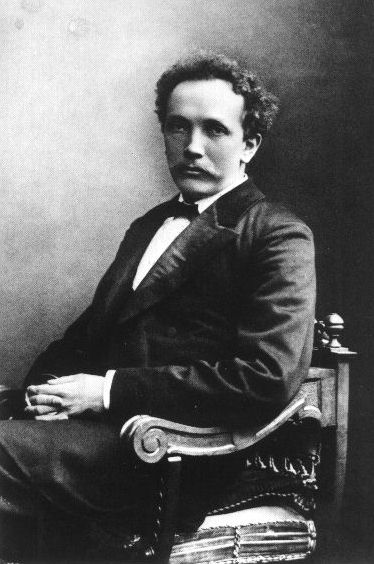Guntram (opera) on:
[Wikipedia]
[Google]
[Amazon]
 ''Guntram'' ( Op. 25) is an
''Guntram'' ( Op. 25) is an
"Wagner a Ramacca?"
''Agorà'' XVI (a. V – January–March 2004), pp. 52–53. (In Italian) It was Strauss' first opera and shows a strong
Richard Strauss works
Operone.de * {{Authority control Operas German-language operas Operas by Richard Strauss 1894 operas Operas set in Germany
 ''Guntram'' ( Op. 25) is an
''Guntram'' ( Op. 25) is an opera
Opera is a form of theatre in which music is a fundamental component and dramatic roles are taken by singers. Such a "work" (the literal translation of the Italian word "opera") is typically a collaboration between a composer and a libr ...
in three acts by Richard Strauss
Richard Georg Strauss (; 11 June 1864 – 8 September 1949) was a German composer, conductor, pianist, and violinist. Considered a leading composer of the late Romantic and early modern eras, he has been described as a successor of Richard Wag ...
with a German libretto
A libretto (Italian for "booklet") is the text used in, or intended for, an extended musical work such as an opera, operetta, masque, oratorio, cantata or musical. The term ''libretto'' is also sometimes used to refer to the text of major li ...
written by the composer. The second act of the opera was composed in Ramacca, Sicily.Antonio Cucuzza"Wagner a Ramacca?"
''Agorà'' XVI (a. V – January–March 2004), pp. 52–53. (In Italian) It was Strauss' first opera and shows a strong
Wagnerian
Wilhelm Richard Wagner ( ; ; 22 May 181313 February 1883) was a German composer, theatre director, polemicist, and conductor who is chiefly known for his operas (or, as some of his mature works were later known, "music dramas"). Unlike most op ...
influence. The music of Guntram is quoted in Strauss's tone poem
A symphonic poem or tone poem is a piece of orchestral music, usually in a single continuous movement, which illustrates or evokes the content of a poem, short story, novel, painting, landscape, or other (non-musical) source. The German term ''T ...
''Ein Heldenleben
''Ein Heldenleben'' (''A Hero's Life''), Op. 40, is a tone poem by Richard Strauss. The work was completed in 1898. It was his eighth work in the genre, and exceeded any of its predecessors in its orchestral demands. Generally agreed to be a ...
''. The composer revised the score in 1940.
Performance history
The opera was not very successful, and was only staged a few times during Strauss' lifetime: The first performance took place on 10 May1894
Events January–March
* January 4 – A military alliance is established between the French Third Republic and the Russian Empire.
* January 7 – William Kennedy Dickson receives a patent for motion picture film in the United S ...
at the Grossherzogliches Hoftheater in Weimar. The soprano role of Freihild was sung by Pauline de Ahna, Strauss's future wife. Later performances conducted by Strauss included those in Munich on 16 November 1895 and in Prague on 9 October 1901. A performance in Frankfurt was given on 9 March 1910 conducted by Ludwig Rottenberg
Ludwig Rottenberg (11 October 1865 – 6 May 1932) was an Austrian/German composer and conductor.
Biography
Rottenberg came from a German-speaking Jewish family in Czernowitz, the then-capital of Bukovina, which at the time was part of the Aust ...
.
The revised version was first given in Weimar on 29 October 1940, conducted by , and later in 1942 in Berlin conducted by Robert Heger
Robert Heger (19 August 1886 – 14 January 1978) was a German conductor and composer from Strasbourg, Alsace-Lorraine.
Life and career
He studied at the Conservatory of Strasbourg under Franz Stockhausen, then in Zurich under Lothar ...
.
In Hamburg, on 4 February 1895, Gustav Mahler
Gustav Mahler (; 7 July 1860 – 18 May 1911) was an Austro-Bohemian Romantic composer, and one of the leading conductors of his generation. As a composer he acted as a bridge between the 19th-century Austro-German tradition and the modernism ...
included the prelude to act 1 in his 6th Philharmonic Concert. He included the preludes to acts 1 and 2 in a concert in Vienna on 19 February 1899, and in New York City on 30 March 1910 with the New York Philharmonic
The New York Philharmonic, officially the Philharmonic-Symphony Society of New York, Inc., globally known as New York Philharmonic Orchestra (NYPO) or New York Philharmonic-Symphony Orchestra, is a symphony orchestra based in New York City. It is ...
.
Roles
Synopsis
Set in medieval Germany, the triangular Wagnerian-style story of love and redemption is about the minstrel Guntram, the evil Duke Robert and his saintly wife Freihild. (The story is not connected with theMerovingian
The Merovingian dynasty () was the ruling family of the Franks from the middle of the 5th century until 751. They first appear as "Kings of the Franks" in the Roman army of northern Gaul. By 509 they had united all the Franks and northern Gaul ...
king Guntram of Burgundy.)
Recordings
References
Further reading
*External links
*Richard Strauss works
Operone.de * {{Authority control Operas German-language operas Operas by Richard Strauss 1894 operas Operas set in Germany